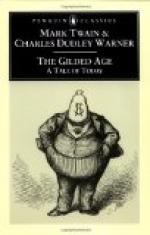To the surprise of Alice, Ruth took to the small gaieties of the village with a zest of enjoyment that seemed foreign to one who had devoted her life to a serious profession from the highest motives. Alice liked society well enough, she thought, but there was nothing exciting in that of Fallkill, nor anything novel in the attentions of the well-bred young gentlemen one met in it. It must have worn a different aspect to Ruth, for she entered into its pleasures at first with curiosity, and then with interest and finally with a kind of staid abandon that no one would have deemed possible for her. Parties, picnics, rowing-matches, moonlight strolls, nutting expeditions in the October woods,—Alice declared that it was a whirl of dissipation. The fondness of Ruth, which was scarcely disguised, for the company of agreeable young fellows, who talked nothings, gave Alice opportunity for no end of banter.
“Do you look upon them as I subjects, dear?” she would ask.
And Ruth laughed her merriest laugh, and then looked sober again. Perhaps she was thinking, after all, whether she knew herself.
If you should rear a duck in the heart of the Sahara, no doubt it would swim if you brought it to the Nile.
Surely no one would have predicted when Ruth left Philadelphia that she would become absorbed to this extent, and so happy, in a life so unlike that she thought she desired. But no one can tell how a woman will act under any circumstances. The reason novelists nearly always fail in depicting women when they make them act, is that they let them do what they have observed some woman has done at sometime or another. And that is where they make a mistake; for a woman will never do again what has been done before. It is this uncertainty that causes women, considered as materials for fiction, to be so interesting to themselves and to others.
As the fall went on and the winter, Ruth did not distinguish herself greatly at the Fallkill Seminary as a student, a fact that apparently gave her no anxiety, and did not diminish her enjoyment of a new sort of power which had awakened within her.
Chapter XXII. In mid-winter, an event occurred of unusual interest to the inhabitants of the Montague house, and to the friends of the young ladies who sought their society.
This was the arrival at the Sassacua Hotel of two young gentlemen from the west.
It is the fashion in New England to give Indian names to the public houses, not that the late lamented savage knew how to keep a hotel, but that his warlike name may impress the traveler who humbly craves shelter there, and make him grateful to the noble and gentlemanly clerk if he is allowed to depart with his scalp safe.




